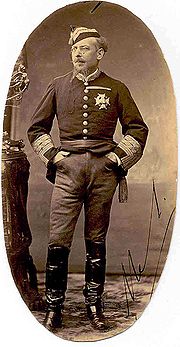
Manuel Pavía y Rodríguez de Alburquerque
Encyclopedia

Cádiz
Cadiz is a city and port in southwestern Spain. It is the capital of the homonymous province, one of eight which make up the autonomous community of Andalusia....
. He was the son of Admiral Pavia, a naval officer of some note in the early part of the 19th century.
Pavia entered the Royal Artillery College at Segovia
Segovia
Segovia is a city in Spain, the capital of Segovia Province in the autonomous community of Castile and León. It is situated north of Madrid, 30 minutes by high speed train. The municipality counts some 55,500 inhabitants.-Etymology:...
in 1841. He became a lieutenant in 1846, a captain in 1855 and major in 1862. Three years later he joined the staff of General Prim, and took part in the two unsuccessful revolutionary movements concerted by Prim in 1866, and, after two years of exile, in the successful revolution of 1868. Pavia showed much vigour against the republican risings in the southern provinces. The governments of King Amadeus of Savoy
Amadeo I of Spain
Amadeo I was the only King of Spain from the House of Savoy...
, from 1871 to 1873, also showed him much favour. After the abdication of that prince, General Pavia put down the Carlists and the cantonal insurrections of the chief towns of the south.
On three occasions during the eventful year 1873, as captain-general of Madrid
Madrid
Madrid is the capital and largest city of Spain. The population of the city is roughly 3.3 million and the entire population of the Madrid metropolitan area is calculated to be 6.271 million. It is the third largest city in the European Union, after London and Berlin, and its metropolitan...
, he offered his services to put an end to the anarchy that was raging in the provinces and to the disorganization prevalent in the Cortes
Cortes Generales
The Cortes Generales is the legislature of Spain. It is a bicameral parliament, composed of the Congress of Deputies and the Senate . The Cortes has power to enact any law and to amend the constitution...
. To all he used the same arguments, namely, that they had to choose between an Alphonsist restoration or a dictatorial, military and political republic, which would rally round its standard all the most conservative groups that had made the revolution of 1868. This he hoped to realize with Emilio Castelar, but the plan was interrupted by the military pronunciamiento for the purpose of dissolving the Cortes of 1873. As soon as the federal Cortes had defeated Castelar, Pavia made his coup d'état of the January 3, 1874, and after the pronunciamiento was absolute master of the situation, but having no personal ambition, he sent for General Serrano
Francisco Serrano y Domínguez, Duke de la Torre
Don Francisco Serrano y Domínguez, 1st Duke of la Torre Grandee of Spain, Count of San Antonio was a Spanish marshal and statesman...
to form a government with Sagasta, Martos
Martos
The city of Martos is located in the province of Jaén in the autonomous community of Andalusia in south-central Spain.It has a population of 24061 inhabitants, making Martos the fifth largest municipality in the province...
, Ulloa
Ulloa
- Places :* the municipality Ulloa in Colombia* the region A Ulloa in Galicia- Persons :* the football referee Berny Ulloa* the football player Fabio Ulloa* the accordionist Francisco Ulloa...
and other Conservatives and Radicals of the revolution.
Pavia sat in the Cortes of the Restoration several times, and once defended himself skillfully against Emilio Castelar, who upbraided him for the part he had played on the 3rd of January 1874. He died suddenly on January 4, 1895.

